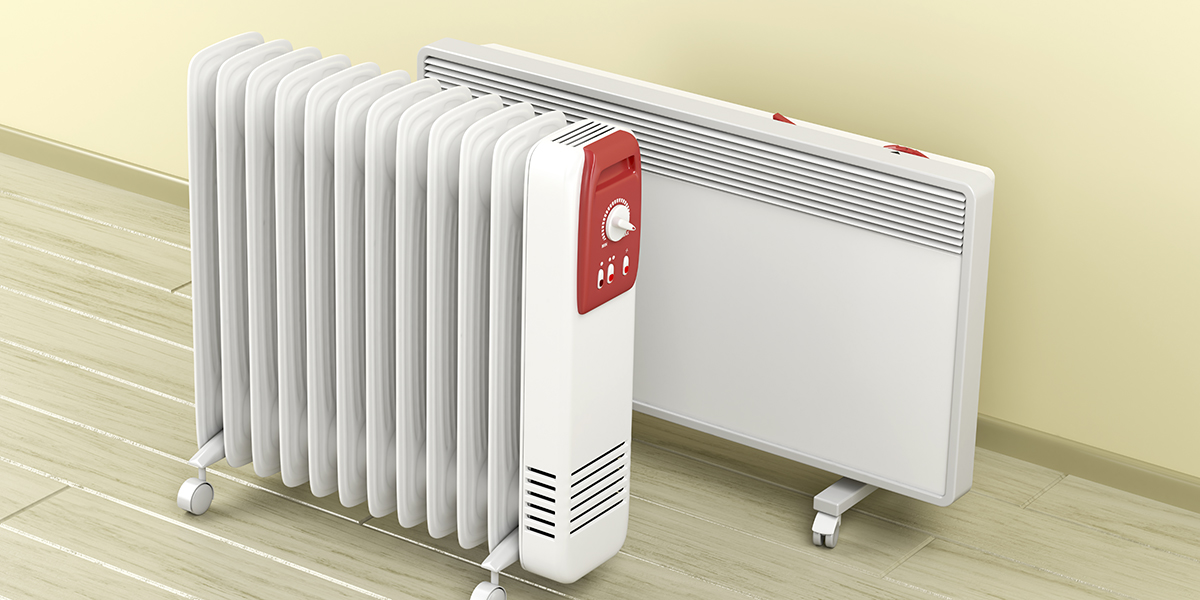Top 5 Dangers of Oil Heaters You Should Not Ignore
If you are considering buying electrically powered oil space heaters for your home or business in Camden, Burlington, or Gloucester Counties, NJ, it is important to understand the dangers of oil heaters as well as their benefits. Understanding how these heaters function will help you be aware of danger signs and be confident that you are using them safely. Keep yourself safe by taking the advice of Davis Home Services.

If you’re ready to make the switch to a gas-powered heating system, call Davis Home Services, the trusted oil to gas conversion experts in Burlington, Gloucester & Camden Counties NJ.
Oil heaters are a cost-effective and fuel-efficient space heater that works by using electrical current to heat oil within enclosed tubes. The heat in the oil radiates out to the surrounding space, raising the temperature. Unlike kerosene heaters, electric oil heaters do not burn the oil during ordinary operation.
Because oil heaters do not rely on combustion, they do not typically produce toxic gases such as carbon monoxide. They can operate safely indoors without the need for ventilation. This greatly improves their safety relative to kerosene heaters and oil-burning furnaces.
However, just because oil heaters are relatively safe does not mean they are completely safe. As with any electrical appliance, they can cause injury or property damage if they malfunction or are misused. It is crucial to follow the manufacturer’s instructions and any warnings about the dangers of oil heaters before using them to heat your home.
Burns From Contact With Space Heaters
Every heater will raise the temperature of the air and household objects around it. Most oil heaters have safety guards that prevent people from burning themselves by accidentally touching a space heater. It is a mistake to rely on such guards and be careful not to touch an oil space heater or put yourself in a situation where you could fall and come into contact with a space heater.
Leaving The Heater Too Close To A Flammable Object
Any appliance that creates heat risks starting fires if its heating elements come too close to curtains or other flammable objects. An electric oil heater should have a guard to prevent accidental contact. Do not use an oil heater with a broken or missing safety guard. Take care to position your heater so that stray objects do not fall onto the heating elements. Dust in the air and on surfaces can also ignite during a fire, causing a rapid spread of fire or an explosion.
Placing The Heater On An Unstable Surface
An oil heater could be a fire hazard if it tips over, especially if it lands on the controls so that it remains stuck in the high heat position. If the heating elements touch thick carpeting or other flammable surfaces, they could ignite over time.
Allowing Oil To Leak From The Oil Heater
Electric oil heaters contain oil within sealed tubes that reduce the risk of the oil coming into contact with sparks or open flames. However, if the heater is cracked or has tipped over so that oil can leak out, the hot oil could catch fire.
Using The Wrong Fuel In An Oil Heater
The oil used in electric oil heaters heats up but does not burn or require you to add or change the oil. It is also in an enclosed tube without access to oxygen for combustion. There should never be any reason to replace the fuel in an oil heater.
If anyone were to introduce a different fuel into the heater and that oil had a lower flashpoint, it could catch fire if someone turned the heater on to a high temperature.
Failure Of Safety Fuses
Oil heaters should stop working if the oil temperature exceeds a safe temperature because the heat trips safety fuses. If the safety fuse is broken, the oil temperature could become high enough to cause the heater to explode and catch fire. This causes several dangers, including:
- Scalding from the hot oil as it escapes from the heater
- Black smoke from partial combustion of the hot oil
- Injury from pieces of the heater ejected by the explosion
Do Oil Heaters Pose A Carbon Monoxide Risk?
Unlike kerosene heaters that burn fuel by design, oil heaters work by heating the oil without combustion. In principle, there should be no risk of carbon monoxide poisoning. However, if the heater is not working properly – if the oil is overheated and exposed to air – combustion could occur, which can release dangerous gases, including carbon monoxide.
Although the risk of carbon monoxide poisoning from an electric oil heater is low, install a carbon monoxide detector in your home and seek a well-ventilated area if the detector triggers an alarm.
Overall Space Heater Safety Tips
Responsible homeowners can take steps to reduce the dangers of oil heaters. These safety tips are useful for other types of heating systems as well.
- Don’t leave your heater on overnight or unsupervised. Unplug your heater immediately if it seems to be overheating or acting strangely.
- Do not use a damaged oil heater.
- Do not attempt to repair an oil heater yourself unless you are a qualified repair technician.
- Use your heater on a level surface.
If you have doubts about the safety of your electric oil heater, contact a professional repair company to inspect the heater and make repairs if needed, or install a new heating or HVAC system.
Are You Ready To Switch To Gas Heating? Davis Home Services In Burlington, Gloucester Or Camden Counties in New Jersey Can Help
If you are troubled by the dangers of oil heaters, installing a gas heater is one option. In addition to safety, there are many reasons to switch from oil to gas.
Davis Home Services offers heating, air conditioning, and plumbing services in Burlington, Cherry Hill, and the surrounding areas in New Jersey, including gas heating and HVAC installation. Act now to take advantage of our latest discounts. Call 844-226-9872 to schedule an appointment with a professional technician today.
Top 5 Dangers of Oil Heaters You Should Not Ignore -in Burlington, Camden & Gloucester Counties – NJ
Oil heaters are economical, fuel-efficient space heaters with many benefits. However, the heaters can be dangerous if mishandled. We recommend following manufacturer guidelines to prevent potential dangers like leakage, explosion, and high voltage.
Davis Home Services can service your space heater or help you convert to a gas-powered heating system. If you live in Burlington, Camden or Gloucester Counties, our team is just a call away for all heating issues. Below are five dangers of oil heaters you shouldn’t ignore:
1. Burns
Electric space heaters feature a heating panel that can get too hot. Contacting the heating element can result in nasty burns. Fortunately, the design features safety guards to prevent contact with the heating element. Still, you should avoid contacting the rails when the heater is operating.
2. Leakages
The oil in electric oil heaters can leak if there’s an issue with the tubes holding it. Leakages are dangerous because oil is combustible and can catch fire. Fires can also increase the risk of an explosion. As such, you should inspect the heater for leakages before turning it on.
3. Fires
Using an oil heater on high voltage can cause a fire. If the heater is stuck in a high heat setting, and the heating element contacts thick carpets or other flammable objects, it can ignite fire over time. Faulty fuses can also fail to trip, allowing the heater to operate on high voltage.
4. Explosions
Explosions occur mainly when the oil heater is used with low units and voltages that can’t carry the heater. Oil heater explosions can cause fire outbreaks and injuries from ejected pieces. Here are tips you can use to prevent oil heater explosions in Burlington and Camden County:
- Use recommended cables
- Follow all manufacturer instructions
- Don’t use oil heaters on low units
- Place the heater in well-ventilated spaces
- Inspect for leakage and faulty parts
5. Spillage
Electric oil heaters typically don’t have any spaces for the oil to escape the tubes. However, in the rare case the hot boiling oil spills outside, it can burn anyone and anything around it. Spillage can also result in slip-and-fall injuries if someone steps on the oil unknowingly.
FAQs About Electric Oil Heaters
- How does an oil heater work?
Oil heaters use electric current to heat oil enclosed in tubes. The hot oil radiates heat into the surrounding space, raising the temperature without the need for combustion.
- Can an oil heater explode?
Yes. While rare, oil heater explosions can happen. The leading cause of explosions is using the heater on low units and faulty fuses that result in high voltage.
- Do oil filled heaters release fumes?
The oil inside the heater is not burned therefore it does not release any gases so there are no fumes.
- How long do oil-filled heaters last?
Oil-filled heaters can last for several years if you take good care of them. Davis Home Services in Gloucester County can help you find quality heaters with lengthy warranties.
- Can you run an oil heater overnight?
Yes. You can leave oil heaters overnight to keep your room warm. The heaters have automatic overheat switches designed to control operating temperatures.

